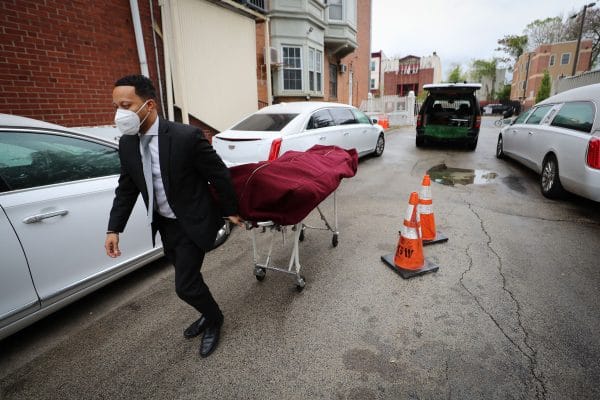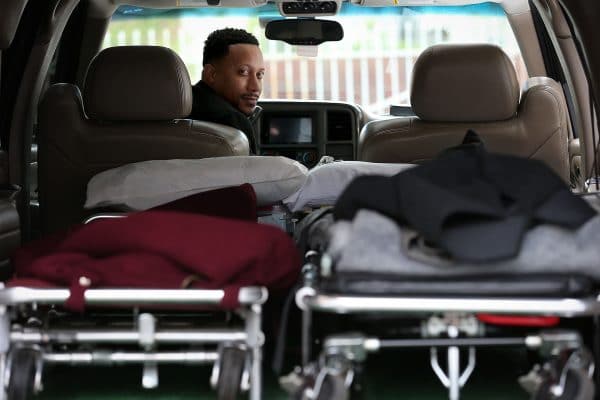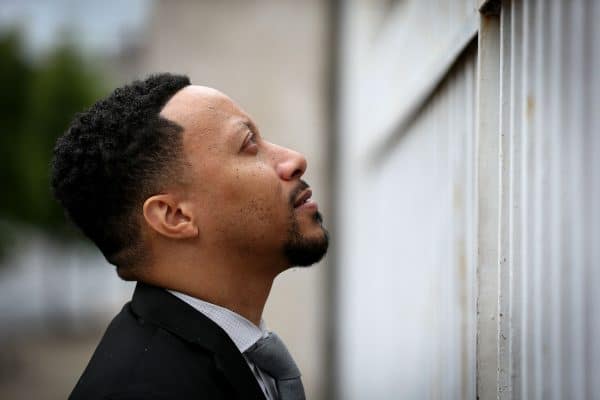Preston Griffin never sleeps. Not really. Even when he sneaks a nap, his iPhone, set at maximum volume, is angled on the pillow, brushing his earlobe. He can’t miss the customized ringtone. The first note blares, and Griffin hops up. A funeral home director is on the line.
He listens to the scant details. Someone just died in a nursing home. A hospital. A home. The funeral director tells him if the coronavirus was to blame. Sometimes, it’s a mystery.
It could be 6 p.m. or 3 a.m. No matter. Griffin’s drill begins. He reaches toward the long, organized row of dark colored suits, shirts and pre-tied ties hanging on a rack nearby. He gets dressed at Army-pace speed. Within minutes, he’s out the door of his West Oak Lane home and into his black Yukon Denali — with a mask, gown, booties, and gloves on the passenger seat, two stretchers and maroon colored body bags in the back. And he heads out into the night.

Preston Griffin delivers a body to the Alfonso Cannon Funeral Chapels in North Philadelphia. “It takes a special type of person to deal with death like that,” Hope Cannon said. (David Maialetti/The Philadelphia Inquirer/TNS)
Time to collect one more body. One more life gone.
“It’s not a job for everyone,” he said. “But it’s a part of life. It’s the end of life. I want to make sure that families know their person is taken care of, that I’ll be gentle with their loved one.”
Almost all funeral directors know Griffin as the dapper, soft-spoken, sensitive, slender guy who represents them in life’s darkest hour. And families who encounter him, even in their grief-soaked fog, remember him fondly. Because the pandemic has robbed families of traditional funerals, even in non-coronavirus deaths, Griffin often becomes the face of their final goodbye.
“I didn’t know Preston personally, but I remember him because he was just so nice to us,” said Elaine Mann, whose mom, Daisy Hill, died from Alzheimer’s disease at the age of 88 on the night of April 29.
At 10:30 p.m., the house on Wingohocking Street in Philadelphia’s Logan neighborhood was packed. Hill had 10 children, nine surviving, 45 grandchildren and more than 60 great-grands. Two of Mann’s brothers wanted to help Griffin wheel their mom’s body to his truck. Griffin agreed. “I have no problem with that,” Griffin recalled telling them.

Preston Griffin, who runs First Class Mortuary Transport, inside his vehicle after delivering a body to the Alfonso Cannon Funeral Chapels in Philadelphia. (David Maialetti/The Philadelphia Inquirer/TNS)
“He does that all day, every day,” Mann said. “He made it look easy.”
Griffin, a 42-year-old single father of two and staff sergeant in the Army reserves, had grown accustomed to his “jump and go” mortuary transport job. But since the pandemic, the number of pickups has tripled. “It’s constant,” he said. “I’m so busy, I don’t have time to think.”
But when he takes a moment to reflect, he feels vulnerable like most in America these days. “It makes you think about your life,” he said. “That it’s short, that it’s unpredictable.”
Funeral homes used to do a lot of the pickups themselves. But now they call on Griffin more often. West Laurel Hill Cemetery and Funeral Home in Bala Cynwyd relies on him exclusively.
“I was trying to protect my funeral directors as much as possible,” said Patricia Quigley, West Laurel Hill funeral director. “And I know Preston is professional. He’s a sweetheart. He’s got the perfect temperament for this. It’s the most intimate moment with the family. They have lost their most precious person and you are the first person allowed to come into that space.

Preston Griffin outside the Alfonso Cannon Funeral Chapels on Broad Street in North Philadelphia, one of his most frequent stops. Between April 17 and April 20, he brought 32 bodies there. (David Maialetti/The Philadelphia Inquirer/TNS)
“I would send him to pick up my own mother,” she said.
Before the pandemic, Griffin almost always met the family of the dead wherever the end came. “You could tell so much about how someone was loved,” he said. “Sometimes, people grab me by the arm and tell me, ‘Please don’t take him away.’ I end up putting the person back down so they can be with their loved one for five more minutes or so. I can’t rush them.”
But those face-to-face meetings haven’t happened for about two months, because relatives are not permitted inside nursing homes or hospitals. “It’s strange,” Griffin said. “It’s weird. I walk into a room and there’s no family. Just a person.
“No one could be there for these people. Husbands, wives, kids, nobody is there when they pass. They’re alone and that really hurts me.”
One morning early this month was unusual. Two pickups, neither coronavirus-related. “Surprisingly,” he said. Either way, Griffin, dressed in a charcoal gray suit, takes the same precautions, treating each case as though it might be infectious.
His first assignment took him from Chestnut Hill Hospital to the Deborah L. Wilson Funeral Home in Germantown. He got out of his truck with the body of an elderly woman in the back, and Debora Wilson-Bailey was on the sidewalk to greet him. “I’m calling him around the clock,” she said. “I don’t know what I’d do without him.”
She said she worries for Griffin because he’s walking into so many hospitals and nursing homes where people have succumbed to the coronavirus. “He keeps going,” she said. “He’s like a clock. He just keeps on ticking.”
Griffin disinfects all his equipment at the end of each job. For the second trip, he pulled into The Hearth at Drexel, an assisted living facility in Bala Cynwyd. He slipped inside, wheeling the stretcher. About 15 minutes passed.
Suddenly the door opened, and nurses and relatives of the deceased stood near the exit door in a semi-circle, their eyes somber and teary above their masks. Then Griffin appeared, wearing a yellow gown, mask, gloves, and booties, pushing the stretcher with the 88-year-old man inside a body bag, with a colorful blanket on top.
Griffin inched toward his truck, as if he were guiding a military funeral procession.
His pace was deliberate. While first responders work at a frantic pace to save lives, Griffin, a last responder, always takes a slow walk away.
“That’s the first time I’ve seen a family at a nursing home in two months,” he said, before taking the man’s body to West Laurel Hill Funeral Home. “I’m glad they were there. They know I’m taking care of their loved ones. I like the family to see me. I feel as though there’s a mystery when they’re not here.”
Later that afternoon, a Hearth employee called West Laurel Hill Funeral Home and left a message: The person who picked up the body was “absolutely wonderful.”
Quigley, the West Laurel Hill funeral director, often marvels at the calls she receives about Griffin.
“Who calls to thank you for the pick-up guy?” she asked. “It’s just not something you hear.”
———
The story of Daniel and Valerie Zane is one of love. They met by accident on a blind date in 1947. Another friend was supposed to show up, but couldn’t make it. Dan was the substitute. They were married 71 years.
As a young man, Dan joined the Army and fought in World War II. He survived the Battle of the Bulge and helped liberate Nazi concentration camps. He later went on to practice law in Manhattan. Val worked as a medical administrator. She was a master bridge player, an avid reader who loved the arts, Broadway music, and the latest fashions. They raised two daughters, Nancie and Robin, and had four grandchildren.
Last year, Nancie and her husband moved her parents to the Philadelphia area to have them close. Valerie had been suffering from Parkinson’s disease and dementia for several years.
They lived in the Quadrangle, a senior living facility in Haverford. She lived in the skilled nursing unit with lots of medical care, and her husband in an independent living apartment.
“My Dad couldn’t sleep though,” Nancie Zane said. After learning that Valerie would call out his name all night long, he began staying by her side for hours until he was sure she was sound asleep.
When the lockdown went into effect, Daniel Zane could no longer go back and forth between the two units. So he moved into an apartment in the nursing unit so he could continue to be with his wife every day. Soon after, a nurse who worked in Valerie’s room tested positive.
Valerie was deteriorating, though not from the virus. Daniel used to say watching his wife slip away was like being crouched in a foxhole during wartime. “But this is tougher,” his son-in-law, Greg Hettwer, recalled him saying.
“The last time he came to her room, he was feeling exhausted and had a cough,” Nancie said. Valerie became unresponsive. Daniel tested positive for the coronavirus and deteriorated fast. A hospice nurse, in a mask, face shield, and gown, held up Daniel’s cell phone so Nancie, Robin, and their families could say goodbye to their parents. In separate rooms, they were both unconscious.
“My Dad sacrificed his life for her. He never stopped loving her, but he did not want to die,” Nancie said. “This isn’t the story of two older people who know it’s their time. My Dad was totally devoted and committed to her, but he was looking forward to being out in the sunshine, going to a park, seeing my sister.
“He had said to me, ‘You learn how to go on and live your life.’”
Valerie died peacefully about 3 p.m. on April 15. She was 91.
Preston Griffin transported her body to West Laurel Hill Funeral Home.
Two days later, shortly after midnight on April 17, Daniel died. He was 94.
Quigley called Griffin once again. “Wait a minute. I was just there, picking up a woman with the same last name,” Griffin remembered telling her.
When he learned what happened, he was shocked and saddened: “It was surreal.”
———
Ellen and Marshall Griffin Jr. don’t quite understand how their only child, Preston, can do what he does.
“This type of work, it’s a gift,” Ellen said. “He has that gift. It’s amazing. I know I couldn’t do it. … It’s his calling.”
Griffin doesn’t see himself that way. “I’m just a regular Joe,” he said.
It all started when he joined the Army reserves 17 years ago following a Catholic school education. One of his duties was to perform honors for military funerals. He played Taps on the bugle and folded and presented the American flag to relatives of veterans.
He became fascinated with the funeral business, and the importance of the send-off. He worked with another transport guy before opening his own business, First Class Mortuary Transport, a year ago. These days, he goes as far as New Jersey, New York, Virginia and Boston for pickups.
The Alfonso Cannon Funeral Chapels on Broad Street in North Philadelphia is one of his most frequent stops. Between Friday, April 17, and Monday, April 20, Hope Cannon said she received 32 bodies. At least 17 of them had died from coronavirus complications, she said.
Griffin handled them all. “I was getting a call on the hour. It was like a blur to me,” Griffin said.
“It takes a special type of person to deal with death like that,” Cannon said. “It’s not like he’s just picking up a body. It’s like he’s picking up one of his loved ones.”
Griffin knows his parents worry. He texts and calls them every day. But he hasn’t seen them in two months. His mom is 65. His dad is 68.
“I fear for them,” he said. “Their immune systems are weaker than mine.” Griffin hasn’t seen his children, ages 14 and 15, much either.
“I can’t see my family and I’m working so much,” he said. “I wouldn’t have time to see them anyway.”
He credits his dad for his self-imposed rule to always wear a suit on the job. Both his parents worked for the State Department of Public Welfare. His mom was a district secretary and caseworker. His dad worked his way up to be a district administrator and always suited up.
“I’d look at him and think I want a job where I can wear a suit every day,” Griffin said.
“I want to give a good impression. I don’t have to be working. I’ll put on a suit to go to the store,” he said with a laugh.
Even with hundreds of jobs under his belt, some stick with him. One happened at the Penn Valley home of Susan Weiss and Lisa Sands on March 29.
Sands had just died from cancer at 52. She had wanted to be home, with Weiss, her wife of four years, until the end. Sands had worked in learning development at Vanguard, loved animals, literature, backyard bird feeders, her pollinator garden, yoga, road trips, thrift stores and Cape May.
Before Griffin arrived, Weiss asked her neighbors if they would feel comfortable coming over to be with her, promising to stand 6 feet apart. Of course, they said.
Griffin pulled up in his black Denali. Like always, he expressed his condolences. Then Weiss told him she had something unusual to ask. Would it be OK if, while he was wheeling the stretcher outside, they took a moment of silence and sprinkled pink rose petals on top of the body bag that she’d covered with a blanket?
Griffin was fine with that. “We each stepped forward with a handful of rose petals,” Weiss recalled.
“It was amazing. Really touching,” Griffin recalled. “I’d never seen anything like it and I felt so honored to be a part of it.”
This time, as he wheeled the stretcher outside, he paused at each step. Anything to slow the walk.
___
© 2020 The Philadelphia Inquirer
Distributed by Tribune Content Agency, LLC.



